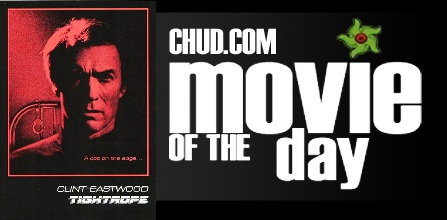The Film:
The Principles: Richard Tuggle (Writer/Director), Clint Eastwood, Genevieve Bujold, Dan Hedaya, Alison Eastwood, Jenny Beck
The Premise:
Eastwood plays a divorced detective in New Orleans who is caught up in the steamy Bourbon Street nightlife that someone is creating a body count in. The closer Eastwood gets, the closer the bad guy gets to those Eastwood cares about.
Is It Good: It is.
I saw this film many times in the early days of HBO, and I couldn’t have been more than 11 or 12 years old when watching it. I had not seen it since, but had fond memories. When we decided to do Clint week, I thought this film would make a fun revisit to see if it still held up. What I wound up with was a movie that was 100 percent different than what I remembered. So much of this movie was above my level of understanding that I thought it was nothing more than a cop trying to find a killer and keep his two daughters safe while doing so.
The title of the film is based upon this quote “There’s a darkness inside all of us. Some act it out. Some try to control it. Most of us walk a tightrope between the two.” This is the perfect lead in to a movie that pushed Clint to one of his limits of public perception. He is a cop that screws every woman he comes in contact with in this film. The more perverse the woman acts, the more interested his character is. To make it harder for the public to accept him, he does this almost every night while leaving his two young girls at home in the care of a baby sitter. The amazing part is the amount of compassion you are still able to feel for Clint, even though his character is essentially a douche.
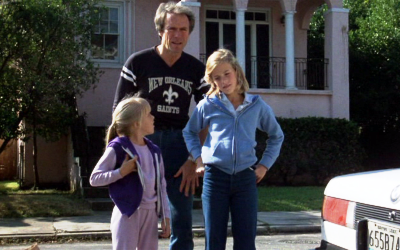
There are a lot of S&M themes mixed with some roleplaying and even some gay themes contained within. Clint screws any female that moves and often does so in the confines of a Brothel or other domicile of the professional working girl. He toys with one of the gay guys too, which could be taken in a variety of ways. Clint is a textbook sex addict in this film. He clearly has an issue about his wife leaving him for another man, and maintains his relationships one payment at a time.
Seeing as the film is about someone murdering prostitutes, this means Clint and the killer run in the same circles. Never does Clint ask where to find out about a girl, and half the time he knows where they worked. He goes into the underworld that New Orleans is so well known for, and navigates as someone who has spent his entire lifetime doing the same (even though he states that he did not do things like that until his wife left). Some of it fits with the story (the prostitutes often knew of him as well as he knew about them) and some of it seemed like a stretch (he walks into a tattoo parlor and tells the guy he did a tattoo for a girl, as if he were the only tattoo artist in New Orleans).
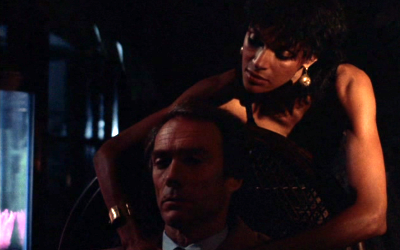
The killer keeps the film budget low buy strangling all of his victims, with only a single exception late in the film. He uses handcuffs, and the proceeds to rape his victims multiple times both vaginally and anally while strangling them (how did my parents ever let me watch this). He’s a messy serial killer, as he leaves semen, blood, half eaten food and some fabric behind at almost every scene. The only thing he doesn’t leave behind are finger prints, and that would have been the thing to identify him with as it was the early 80s. As the story progresses, the body count gets quite high. The killer starts killing quicker and more frantically as he makes his way into Clint’s life.
The daughters are played by Jenny Beck, as a blond girl that resembled Heather O’rourke from Poltergeist and Alison Eastwood, the real life Daughter of Clint. The chemistry plays out extremely well, and the family seems like a very natural alpha male led household that is missing a feminine touch. Both his daughters are into Saints football to the point where a football is a constant prop any time they are on the screen. Watching the youngest ask her dad about sexual slang and seeing this rock hard detective squirm as he tries to find a good way to explain worked extremely well to take the sleaze ball detective and make him multi-dimensional.
To further build on character there is a developing relationship with Genevieve Bujold. He first sees Bujold as a nuisance, but through her persistence about her interest in the murders he is forced to continue communication with her. The relationship feels very natural, even though introducing her to his children on the second date felt a little rushed. It is playing against her that Clint really shines as a man that is struggling with the choices he has made and the risk his family is in. He blames himself for not being smart enough to properly protect his family, and in a couple of scenes near the climax he does one of the most nuanced characterizations that I have ever seen from Clint. He goes from rage to chin quivering in a matter of moments.
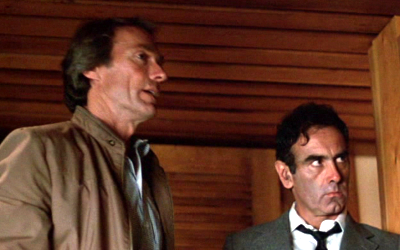
Tightrope is approaching 30 years old, and it amazingly holds up extremely well. The lack of cell phones stood out at one point as Clint rushes into a gas station to call his house. Some of the detective techniques were a little outdated, but other than that it holds true as a good cop thriller with a dark and sexy side.
Is It Worth A Look: It is. To me, this is a little talked about Eastwood film. The only reason I can think of is that it was one of his cop films that didn’t spawn a lot of sequels. The listed director and screenwriter, Richard Tuggle, was one of the screenwriters for Escape from Alcatraz.
The directing does a nice job capturing the seedy underworld of New Orleans and using the locations really set the movie there. There is a date on a river boat, a showdown in a cemetery and a lot of focus on the nightlife on Bourbon Street. They uses a lot of lighting choices that fit very well in context of the film, but wouldn’t fit in a lot of films (A lot of red lighting is used, even so much that the movie poster and dvd covers used them also). The figuring out the identity of the killer seemed to happen a little randomly, but I suppose it worked as they had been circling his identity and his place of employment.
I chose this to get one of the lesser known cop stories with Clint, and what I wound up with was a very adult film that presented a not so perfect Clint in one of his most diverse roles. It is definitely enjoyed more by an older audience that understands what is going on more than an 11 year old.
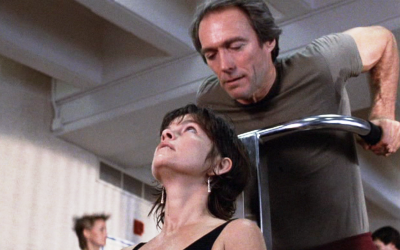
Random Anecdotes:
Eastwood actually let Tuggle go after on two days on set, and picked up the reigns directing the film. Eastwood was often trying to help industry workers by taking a chance with them (as he had with Michal Cimini), but didn’t feel Tuggle was up to the task.
Clint was often mentioned in Best Actor Oscar contention for Tightrope, though that never happened. He would not nominated until Unforgiven.
Cinematic Soulmates:Dead Pool, Sudden Impact, 8mm, Seven, Dirty Harry, Escape From Alcatraz
